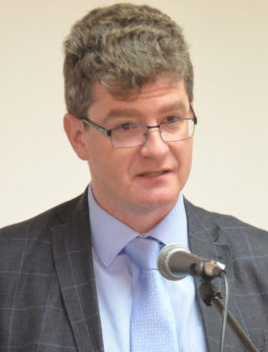British High Commissioner to Guyana Greg Quinn yesterday called on the government and the opposition to cooperate to resolve the current political uncertainty over the holding of elections as less than a week remains for them to be held unless an extension is agreed.
“We’re now in a situation where both sides need to come together and decide what the solution is and how we get over the current issue,” Quinn told reporters while responding to questions shortly after a joint press conference hosted by himself and the visiting Lord Provost of Aberdeen, Barney Crockett.
On December 21st, a vote by then APNU+AFC Member of Parliament Charrandass Persaud on an opposition PPP/C-sponsored no-confidence motion against the government tipped the scales 33 to 32 in favour of its passage.
Consequently, Speaker of the National Assembly Dr Barton Scotland ruled that the motion had been carried. Although Article 106 (7) stipulates that an election should be held within three months after the passage of the motion, preparations have yet to start and government, which had initially accepted the outcome of the vote, is in the midst of a court challenge to its validity.
Already, Chief Justice (ag) Roxane George-Wiltshire has ruled that the vote was correctly tabulated, was validily passed and that this should have resulted in the immediate resignation of the Cabinet, which includes the president.
Those judgments are being challenged in the Guyana Court of Appeal. It has already been established that the matter will likely reach the Caribbean Court of Justice (CCJ) for final adjudication.
The Guyana Elections Commission (GECOM) has already ruled out its capacity to hold polls by the constitutional deadline.
Asked yesterday about GECOM’s inability to meet the March 21st deadline, Quinn said the political leaders have to act responsibly and reach an understanding, which would see that deadline being extended. Article 106(7) also provides for an extension of the deadline for the polls once it is agreed to by at least two-thirds of the elected members of the National Assembly.
“If the Elections Commission is not ready and everybody agrees that it’s not ready, if that’s a decision taken then, you know, there needs to be a process to follow, to extend what is that three months date, which started on the 21st of December. So, it is now sort of contingent on those who are responsible to try and do that to actually do that,” he stressed.
In response to comments being made by the opposition that government becomes illegal after March 21st, Quinn expressed hope that there will be a resolution before that date.
“I am hoping there will be a resolution and that’s certainly what I think everybody wants to see before we get to that stage,” he said.
President David Granger and Opposition Leader Bharrat Jagdeo have met twice in an attempt to find common ground. Both meetings ended with very little being achieved, according to Jagdeo. The second meeting did not go far as Jagdeo contends that the president declined to name a date for elections. He, however, agreed that he would meet a third time after the president would have held discussions with GECOM as to the state of readiness to hold elections within the shortest possible time. The commission is yet to solidify a timeframe and budget for the holding of general elections. A meeting held on Thursday saw the opposition-nominated commissioners walking out.
Jagdeo is insisting that elections have to be held before April 30th, when the current voters’ list expires.






